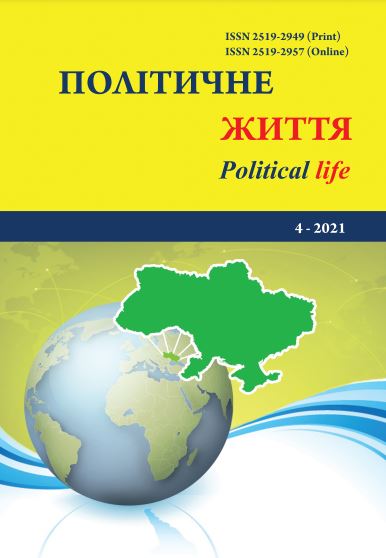Economic, social and ethnic values of male and female students in political science communities of Ukraine and Moldova
DOI:
https://doi.org/10.31558/2519-2949.2021.4.8Keywords:
economic values; social values; ethnic values; history of political science; Ukraine; MoldovaAbstract
The article is devoted to revealing economic, social and ethnic values of male and female students in political science communities in Ukraine (Lviv, Kharkiv, Simferopol) and Moldova (Chisinau) during 2012-2013. This work is a part of a larger study which captures the state of Ukrainian political science during 2012–2013 and provides a better understanding of the political, social, ethnic, economic, gender and disciplinary views of students on the eve of the Revolution of Dignity. The empirical basis of this article is a survey of the students enrolled in three types of academic programs (bachelor’s, specialist’s and master’s degrees) at four universities: Ivan Franko National University of Lviv, V. N. Karazin Kharkiv National University, V. I. Vernadsky Taurida National University and Moldova State University.
The economic values of Ukrainian and Moldovan students assume an active role of the state, but the importance of the latter decreases with the growth of the total income of their family of origin. The “nationalism” of Ukrainian and Moldovan students concerning social values means the inadmissibility of a homosexual lifestyle, while liberals are more tolerant on this issue. Besides Ukrainian nationalists are generally tolerant of women’s right to decide on abortion, although liberals are still more tolerant. In this respect, Moldovan liberals are more conservative. Ukrainian and Moldovan “nationalism” is more tolerant than Ukrainian and Moldovan “liberalism” towards a couple, living together without wishing to get married. The ethnic values of Ukrainian and Moldovan students are more strongly influenced by ideological orientations. On the one hand, “nationalists” tend to deny the problem of racism in society, while liberals are more willing to acknowledge it. On the other hand, liberals are less inclined to believe that there should be only one state language in a country, while “nationalists” are almost absolutely sure of it. The final part of the article concludes that it is necessary to study the economic, cultural, regional and religious factors determining these values of male and female students.
References
Горбатенко І. А. Політична наука і освіта в Україні: передумови виникнення, процес становлення, перспективи розвитку. автореф. дис. … канд. політ. наук : 23.00.01. Київ, 2007. 21 с.
Куделя С. Чи можлива в Україні політична наука? Критика. 2012. № 1–2. С. 24–25.
Мацієвський Ю. Чому в нас немає політичної науки. Критика. 2012. № 6. С. 10–12.
Олійник Є. Ю. Інституціоналізація, національна специфіка, перспективи розвитку політичної науки в Україні. дис. … канд. політ. наук : 23.00.01. Чернівці, 2013. 202 с.
Осин В., Зеленски А., Шуляк С. Власть и знание на постсоветском пространстве: политический режим, научная степень, идеология и карьера в Украине и Молдове. Вильнюс, 2014. 376 с.
Старіш О. Політична наука в Україні: 20 років незалежности. Критика. 2012. № 9– 10. С. 27–29.
Eisfeld, R., & Pal, L. Political Science in Central-East Europe and the Impact of Politics: Political Science In Central-East Europe. 2010. P. 9-36. DOI: 10.2307/j.ctvhhhhgs.4
Kaase M. Sparschuh V. Three Social Science Disciplines in Central and Eastern Europe: Handbook on Economics, Political Science and Sociology (1989–2001), Berlin/Budapest: GESIS/Collegium Budapest, 2002.
Krauz-Mozer B., Kułakowska M., Borowiec P., Ścigaj P. Political Science in Europe at the Beginning of the 21st Century. Kraków: Jagiellonian University Press, 2015. 612 p.
Kruglashov A. Ukrainian Political Science: From Quantity to Quality / R. Eisfeld, L.A. Pal (eds.) Political Science in Central-East Europe, Opladen/Farmington Hills: Barbara Budrich, 2010. Р. 291-304
Rothman S., Kelly-Woessner A., Woessner M. The Still Divided Academy: How Competing Visions of Power, Politics, and Diversity Complicate the Mission of Higher Education. Rowman & Littlefield Publishers, 2011. 282 p.
Shevel O. Ukrainian Political Science and the Study of Ukraine within American Political Science: How Similar, How Different? Journal of Ukrainian Politics and Society. 2015. Р. 23–32.

